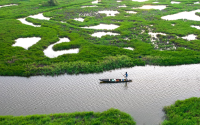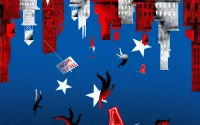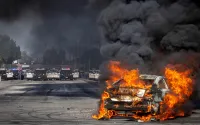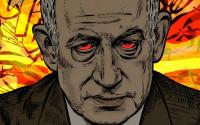26 March 2007Stephen Castle
Europe's leaders toughened their stand against mass murder in Darfur yesterday, issuing new threats against the Sudanese government, as their own 50th birthday celebration summit was thrown off balance by the unprecedented appeal from Europe's leading writers for action. Darfur forced its way on to the meeting's agenda after a coalition of European writers and intellectuals spoilt the self-congratulatory party with a devastating critique of the bloc's failure to act to end the violence in the Sudanese province. Today, about 2.5 million people are displaced and more than 200,000 civilians are dead as a result of government-sponsored violence.
Despite the scale of murder since the conflict began in 2003 - the US has described it as genocide - there has been no attempt to launch the kind of humanitarian intervention that saved civilian lives in Kosovo.
In a letter to the 27 leaders of EU states, published by The Independent, 10 of the continent's leading writers and thinkers recalled the atrocities of Auschwitz and Srebrenica in their call for immediate action against the Sudanese regime and President Omar al-Bashir.
The signatories included Tom Stoppard, Seamus Heaney, Harold Pinter, Dario Fo, Günter Grass, Umberto Eco, Bernard-Henri Lévy, Franca Rame and Václav Havel.
The intervention had an immediate effect on Angela Merkel, the Chancellor of Germany, which holds the EU presidency, who called on fellow leaders to consider stricter sanctions against the government in Khartoum.
She said the EU wanted President Bashir to allow UN peacekeepers into the country and comply with UN resolutions.
"We think of the people in Zimbabwe and Darfur. The suffering there is unbearable, We must look at stronger sanctions" she said
Tony Blair, who sent a letter to Ms Merkel pressing for talks on the issue, demanded renewed efforts at the United Nations to put in place a no-fly zone to prevent the Sudanese air force causing more loss of life.
In Berlin, Mr Blair held a meeting with one of the victims of the violence, Ishag Mekki, whose sister was murdered in her own home. "Had you leaders acted earlier and intervened, today I would have my elder sister alive," Mr Mekki said.
Yesterday's summit in Berlin was called to mark the EU's 50th birthday. The event involved a concert, a banquet and a formal lunch yesterday.
The issue of Darfur had not been scheduled for debate, though Europe's leaders were due to discuss Europe's role in the world. In the end the plight of the province was raised over a lunch of crab with bacon and broiled beef with beetroot, red wine and onion sauce.
Earlier, Ms Merkel used a speech to describe the suffering in Darfur as "unbearable" and said: "I want to state frankly that we have to consider stronger sanctions". The comments mark a clear change of tone because some leaders have argued that they have a better chance of influencing the government in Khartoum if they engage with it.
The EU has very limited sanctions in place including an arms embargo and visa ban on a handful of military officers. Calls by campaigners for an immediate extension of the restrictions and an assets freeze were not taken up, though these could be imposed at a formal meeting of EU foreign ministers next month.
Yesterday Mr Blair argued: "The situation in Darfur is intolerable. Over 200,000 people have died, there are some two million people displaced".
"The actions of the Sudanese government are completely unacceptable. It is, in my view, essential for the international community to take a new resolution on Darfur to the UN Security Council. We need to extend the sanctions regime.
"It is a test for us as a community also for the UN. I think there is a feeling in some quarters that this issue will just somehow go off the international agenda. Today has shown it will not. It will stay until something is done."
Romano Prodi, the Italian Prime Minister, described Darfur as a "chronic drama".
Four years of war and terror
The Darfur conflict is an armed struggle in western Sudan, largely between the Janjaweed ("devils on horseback"), a militia group recruited by the government from Bedouin Arabs, and the mostly land-tilling tribes of the region.
* ORIGINS OF THE STRUGGLE
The conflict began in 2003 when the Sudan Liberation Army (SLA) attacked government forces in Darfur. Unlike in the Second Sudanese Civil War, which was fought between the primarily Muslim north and Christian and Animist south, in Darfur most people are Muslim, as are the Janjaweed.
* REFUGEES
Between February and April 2003 refugees began arriving in eastern Chad. Large numbers of civilians became internally displaced within Darfur. Another rebel group, the Justice and Equality Movement (JEM) emerged in Darfur. By May 2003 the first air raids were being conducted on African villages.
* UNITED NATIONS
The Security Council called on Khartoum to disarm the Janjaweed. In January 2005 a UN report accused the government and militias of systematic abuses in Darfur, but stopped short of calling the violence genocide. Recommended that the Security Council refer the situation in Darfur to the International Criminal Court.
* CASUALTIES
Sudan says no more than 9,000 people have been killed; most NGOs and the United Nations use 200,000 to more than 400,000. As many as 2.5 million are thought to have been displaced as of October 2006.
* AFRICAN UNION
After fighting worsened last year the Security Council called for a new 17,300-strong UN peacekeeping force to replace ineffectual 7,000-troop African Union mission.
http://news.independent.co.uk/world/africa/article2393302.ece






